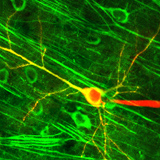This is according to a study by Prof. Uri Goldbort from the Department of Epidemiology and Preventive Medicine at Tel Aviv University

The high-calorie holiday meals carry at least one piece of good news: Israelis who develop slight excess weight and folds of fat in the arms are at a reduced risk of developing Alzheimer's and dementia diseases that impair memory in the golden age - a new Israeli study found.
In a study conducted by Prof. Uri Goldbort from the Department of Epidemiology and Preventive Medicine at Tel Aviv University, it was also found that overweight people who tried to lose weight around middle age increased their risk of Alzheimer's. The author of the study clarifies that "according to the data there is no justification to automatically diagnose people with slight excess weight as blue".
The research is part of an Israeli project that began at Tel Aviv University in 1963, and as part of which data was collected on 10,232 men around the age of forty, all civil servants and the municipalities of Tel Aviv, Jerusalem and Haifa. 37 years later, in 2000, the subjects were followed up. A recent processing of the data found that out of 1,892 people who survived to the age of 80 or so, 307 were diagnosed with dementia and that its prevalence was particularly high among people who suffered 37 years earlier from severe obesity or underweight.
However, in those who were slightly overweight, the prevalence of dementia was measured, which was similar to that among those who were of normal weight.
When measuring the fat folds in the arm using a special device, it was found that the larger the fat folds were, the lower the risk of dementia. 243 people were diagnosed with fat folds in the arm 4 to 7 mm in length in the 60s and of these, 20.6% developed dementia 37 years later. However, of the 282 people with fat folds 14 to 17 mm long, only 15.6% developed dementia by the year 2000, and of the 312 people with fat folds 18 to 43 mm long - only 14.8%.
"The relationship between obesity and thinness and dementia has not yet been explained, but the findings are the opposite of the popular assumption that fat inevitably causes excess morbidity," says Goldbort. According to him, "There are people who are slightly overweight, of whom the health system demands too much today. It is necessary to define which people are at high risk of extreme obesity and treat them, but in a large part of the overweight group there is almost no difference in long-term risks compared to people of normal weight. Diagnosing overweight people as automatically blue in need of treatment is an economic measure, but it has no justification in terms of the data."
It was also found that the more diets a person tries in middle age, and the more weight changes the body undergoes, the greater the risk of dementia. When the subjects' weight went through three dramatic changes in middle age, the risk of dementia 37 years later increased by 66% compared to the subjects without any dramatic changes in weight in middle age. "It is possible that weight change in middle age affects brain areas responsible for obesity, such as the hippocampus. You should also take into account the consequences for the third age, when deciding on an interventional diet in middle age," says Goldbrot.
Previous findings in the follow-up study have already pointed to the obesity paradox, which manifests itself in attributing health virtues to overweight people. According to a finding presented in January 2007, slightly overweight Israeli men have a similar chance of reaching the age of 80 as healthy ones. It also turned out that a slight increase in weight around the age of 40 actually improves the chances of longevity.
According to data from the Ministry of Health, 39% of adults in Israel are slightly overweight to obese: 33% of women and 46% of men.

One response
What is meant by diet?
Does it mean weight loss (in any way, for example, sports) or a change in dietary habits?